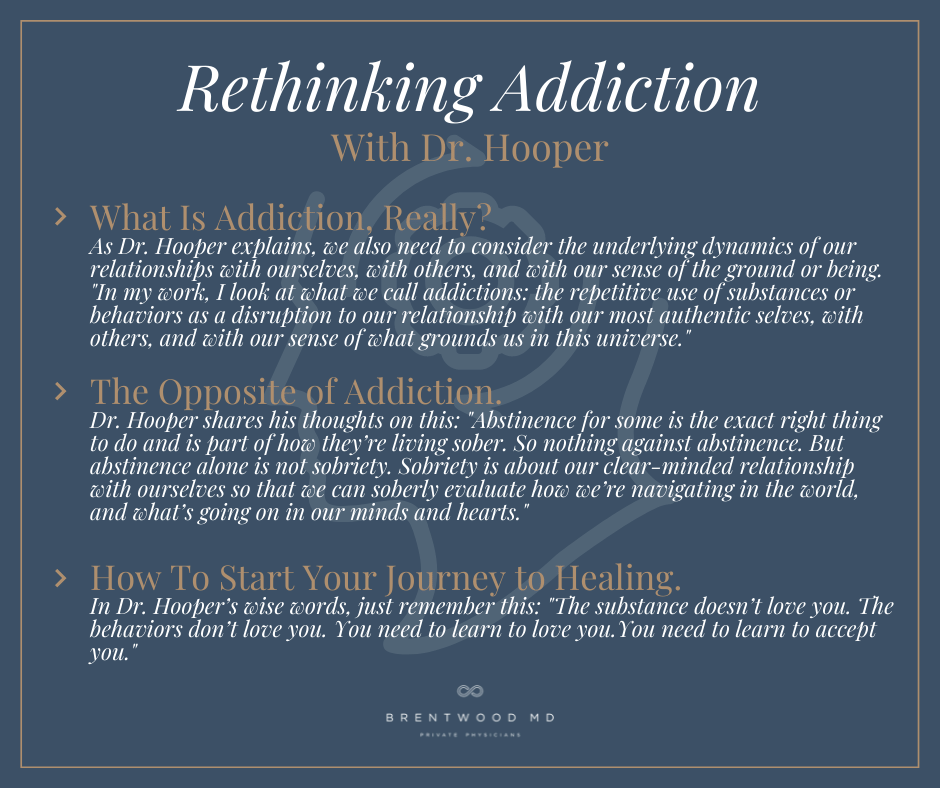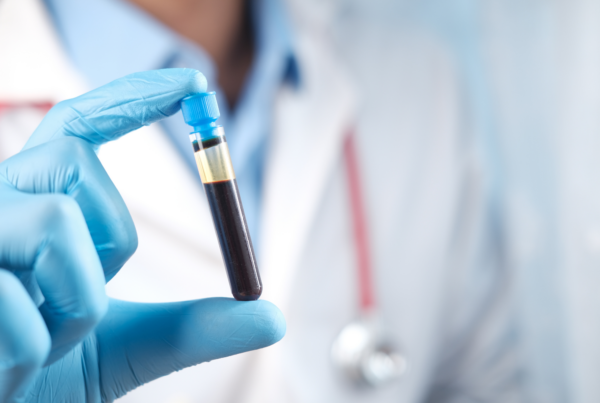Download file | Play in new window |
Do you have an addiction?
It’s a simple question, yet it can be difficult to answer — because addiction is so misunderstood.
I believe we need a new, better approach to discussing addiction in order to achieve true healing, which is why I’ve asked my dear friend Dr. Hooper to join me in exploring this topic.
As a clinical psychologist and minister, Dr. Hooper works with people of all backgrounds and walks of life to maximize their wholeness and well-being. He understands the complexities of addiction and expertly blends psychology, ministry, and spirituality to help others achieve healing.
If there’s anybody who can help us reframe our perception of and reaction to addiction, it’s Dr. Hooper.
What Is Addiction, Really?
It only takes a few clicks on Google to find varying definitions of addiction, though the American Psychiatric Association’s Diagnostic and Statistical Manual of Mental Disorders doesn’t even use that term. Instead, it refers to “substance use disorders” as a cluster of cognitive, behavioral, and physiological symptoms indicating that an individual continues using a substance despite significant substance-related problems.
This may be true, but it’s not the whole story. As Dr. Hooper explains, we also need to consider the underlying dynamics of our relationships with ourselves, with others, and with our sense of the ground or being.
In my work, I look at what we call addictions: the repetitive use of substances or behaviors as a disruption to our relationship with our most authentic selves, with others, and with our sense of what grounds us in this universe.
Approaching any type of addiction from a place of judgment won’t do much good. Dr. Hooper uses this analogy:
It’s like the coroner walking into the room and looking at the dead man and saying, “Excuse me, sir, you’re dead. That’s not a good thing, and you really should stop that.” The diagnosis does not provide the medicine.
The Opposite of Addiction
If addiction is losing connection with your most authentic self to the grips of a perpetual, uncontrollable urge, then what is the opposite? And how do we claim that somebody has “recovered” from addiction?
The answer is right there in the word. When you achieve recovery, you quite literally recover or reclaim yourself. Some people unearth their authentic selves for the first time in their lives.
You might also think of the term “sobriety” as the opposite of addiction. I like this word, but just like addiction, sobriety is misunderstood. It’s often assumed to mean “abstinence,” which isn’t necessarily true. Abstinence can be a part of sobriety, but it isn’t sobriety itself.
Dr. Hooper shares his thoughts on this:
Abstinence for some is the exact right thing to do and is part of how they’re living sober. So nothing against abstinence. But abstinence alone is not sobriety. Sobriety is about our clear-minded relationship with ourselves so that we can soberly evaluate how we’re navigating in the world, and what’s going on in our minds and hearts.
Through sobriety, Dr. Hooper continues, we’re set free to ask questions and answer them honestly: why do I feel the compulsion to do this, say this, drink that, inject that? This deep understanding of sobriety is transformative. We practice getting to know ourselves and our true needs, then find ways to meet those needs in ways that are whole-making.
It calls to mind the Hebrew term shalom, often translated as peace in English. Shalom doesn’t just mean the absence of conflict; it means the presence of wholeness and well-being. Real sobriety is about stepping into wholeness and well-being.
Stop Asking “What’s Wrong With Me?”
When it comes to addiction, we’re asking the wrong questions. They stem from a place of judgment, not a sense of empathy.
There is always some trauma that underlies the ongoing use and abuse of substances or behaviors, though each person’s trauma is unique. We use that next drink, or next fix, or next dice roll to soothe ourselves. But those behaviors don’t help us, and they’re a poor substitute for what we really need: authentic connection with ourself and others.
Believe it or not, Dr. Hooper explains, underneath addiction there can be a gift. But there’s no new life without death. There first has to be a death of your old way of life, a death of clinging to the behaviors or substances you’ve always relied on for support.
You have to trust that there is something within you that’s capable of catching you and steering you toward recovery. You have to trust in a broader connection to life itself, trust that life is good and true and beautiful, even when you’re not experiencing it.
So stop asking, What’s wrong with me? and start asking, What happened to me? Once you identify why you’re hurting, a journey to healing can finally begin.
The Danger of Never Taking Action
It’s easier to continue pouring yourself a drink — or four, or six — each night than it is to pour every bottle of liquor down the drain and ask yourself some serious questions. If you never ask the right questions about your addiction, the consequences are serious. You perpetuate the same behaviors, hope for different results, and become increasingly depressed and depleted when nothing ever changes.
Of course, the consequences aren’t only psychological. They’re also physiological. Alcohol damages your liver, drugs destroy your body, and even non-substance addictions trigger the release of corrosive cortisol that plagues your body and spirit. The consequence of untreated addiction is often living in your own prison of loneliness and anger.
We say we have a disease, but really, the disease has us.
How To Start Your Journey to Healing
Your journey to healing won’t be one that you take alone. Your true, authentic self is still there, buried underneath your addiction, so you need to find the right person to guide you through recovery in a gentle, empathetic, non-judgmental way.
Dr. Hooper recommends three key strategies to support your journey to healing.
Be Honest With Yourself and Someone Else
First, be awake and aware of what’s going on — within you, between you and others, and in the world around you. Ask yourself, how is your use of a substance or behavior interfering with your ability to be awake and aware? If you can finally shed the layers of denial and be honest with yourself, you can find a path forward.
Once you’re honest with yourself, be honest with someone else. Whether it’s a friend, a relative, or a professional, share your struggles so that you have the support you need as you begin to heal.
Make a Plan
Any new project requires a plan to carry it out.
Consider your situation with the honesty you’ve found. What steps do you need to take? What resources will you need? How will you get them? You could have a trusted friend, loved one, or professional help you work out a definite and realistic plan for your recovery.
Your plan could include AA meetings or a change of scenery. It could include making certain practical changes in your life. The point is to think through what you’ll need to help you on this journey.
Change Your Environment
One of the most effective ways to achieve any kind of behavior change is to change your environment, and this holds true with addiction as well.
Willpower alone is never enough to make the kind of changes you’re after. Addiction has rewired your brain to receive immediate comfort from a certain substance or behavior, which isn’t something you can overcome with just your will.
For example, a person struggling with alcohol addiction cannot successfully change their behavior if they have a full bar at home. The bar will win every time. But they can pack up that bar and send it away. This change to the environment — in this case, a change to their constant access to alcohol — allows them the space to begin to heal.
When you no longer have easy access to the substance or behavior, you can start to retrain your brain to receive comfort in new, healthy ways.
You Can Recover
Through honesty, planning, and a healthy environment, you can get the help you need and maintain a positive support system on your journey to recovering your authentic self.
In Dr. Hooper’s wise words, just remember this:
The substance doesn’t love you.
The behaviors don’t love you.
You need to learn to love you.
You need to learn to accept you.

Dr. Aaron Wenzel is a concierge physician specializing in the care of fast-moving entrepreneurs, executives, and public figures in the Nashville, TN area. Dr. Wenzel’s diverse life experience and extensive training in family medicine, emergency care, nutrition, and hormone replacement therapies give him the unique platform to provide unmatched care for his patients.








